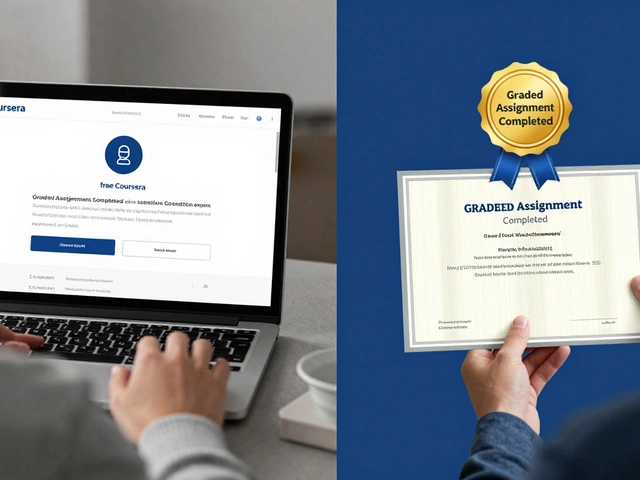Most of the top coders you follow online never stepped into a coding class. They learned at home, on the couch, in coffee shops, and after work, piecing things together from YouTube, Stack Overflow, and free courses. If you’re wondering if you can skip the classroom, you’re in good company. Elon Musk once said you can learn almost anything online for free—turns out that applies to code, too.
Here’s the wild part: tech companies like Google and Apple dropped their degree requirements years ago. They care more about what you can build than where you learned. Even job listings now often say “self-taught candidates welcome.” That’s a massive shift.
So, what’s the catch? Learning to code without structure can feel like wandering a maze blindfolded. Some days you’ll be on fire, building your first website or automating tasks you didn’t even know could be automated. Other days, you’ll stare at error messages for hours, wondering if you’re even cut out for this. That’s just part of the deal.
The truth is, self-taught coders don’t have superpowers. They use a mix of free and cheap resources, a bunch of stubbornness, and trial & error to get where they are. Don’t let anyone tell you it’s about being a genius. Persistence is the real secret. Ready to see how it actually works?
- Why People Skip Formal Coding Classes
- Tools and Resources for Self-Taught Coders
- Common Roadblocks and How to Beat Them
- How Self-Taught Coders Succeed (or Crash)
Why People Skip Formal Coding Classes
Skip the lecture hall, save thousands of dollars, and learn on your own time—that’s the basic math driving a ton of folks to ditch traditional coding schools. College tuition in the US has jumped over 200% since the 1980s, and the average computer science degree now sets you back about $40,000 a year. No wonder coding bootcamps and DIY learning are taking off.
Lots of coders just want to build things fast, not sit through years of lectures. The tech world moves way too quickly for slow curriculums anyway; some college courses still use programming languages or methods that are already out-of-date by graduation. In contrast, self-taught coders can jump straight into the latest frameworks, tools, and real-world projects—no waiting.
Remote work is a huge push factor too. Tons of companies, especially startups, care more about your GitHub repo than your diploma. In a famous 2022 Stack Overflow survey, more than 70% of professional developers said they learned a new language or technology from online resources, not school. In fact, nearly 40% never took a single formal class in their main area of expertise.
Here’s a simple breakdown comparing different ways to learn to code:
| Path | Average Cost | Time Commitment | Flexibility |
|---|---|---|---|
| Computer Science Degree | $40,000/year | 3-4 years | Low |
| Bootcamp | $8,000 - $20,000 | 3-6 months | Medium |
| Self-Taught Coding | Free - $1,000 | Varies (totally up to you) | High |
The other reason people go solo? Control. You pick what you want to learn, when you want to learn it, and how deep you want to go. Got a job and only an hour a night? No problem. Want to swap topics halfway through? You don’t need anyone’s permission.
Is it always better? Not for everyone. Some folks need structure and feedback to stay on track. But with the explosion of online resources, forums, and free guides, going the self-taught coding route has never been easier or more popular.
Tools and Resources for Self-Taught Coders
There’s no shortage of stuff out there if you want to become self-taught. Some folks start on their phones with free apps; others jump right into interactive sites that walk you through real code. Here’s what works best for most newbies and ambitious coders alike.
The big players like freeCodeCamp, Codecademy, and The Odin Project let you learn by doing, not just reading. On freeCodeCamp, over a million people have gotten their hands dirty and built real projects that make your portfolio pop. You solve challenges, then actually deploy websites or apps, which is what employers eat up.
But that’s not all. YouTube is packed with tutorials that break down every topic, from Python basics to building games with JavaScript. Channels like Programming with Mosh and CS Dojo are favorites—these guys don’t waste your time and keep things practical. You want something you can reference while you code? Stack Overflow is a goldmine, almost like a 24/7 study group where someone has usually faced (and solved) your exact problem.
- self-taught coding is easier with GitHub for sharing your code, finding inspiration, and collaborating without even knowing anyone in tech yet.
- For getting feedback and support, communities like Reddit’s r/learnprogramming and Discord servers help you not get stuck and give you quick advice.
- If you prefer books, grab "Automate the Boring Stuff with Python" for practical, beginner-friendly projects, or “Eloquent JavaScript” for a deeper dive into how things work.
- Want to test your skills? Sites like LeetCode and HackerRank are packed with coding problems, great for interview prep and keeping your brain in shape.
If cost is a worry, check out this quick comparison of what’s free, what’s not, and where you’ll get the most bang for your buck:
| Resource | Type | Free | Paid option | Strength |
|---|---|---|---|---|
| freeCodeCamp | Interactive/Web | ✔️ | Beginner-friendly, project-based | |
| Codecademy | Interactive | ✔️ (Basic) | ✔️ | Guided learning paths |
| Udemy | Video Courses | ✔️ (often discounted) | Huge variety, step-by-step | |
| The Odin Project | Full Curriculum | ✔️ | Comprehensive, open source | |
| GitHub | Code Sharing | ✔️ | Portfolio building, collaboration | |
| YouTube | Video Tutorials | ✔️ | Visual, beginner to advanced |
Don’t get overwhelmed by all the options. Pick one or two solid resources, actually code along, and use online communities when you hit a wall. The real trick is to build small things first, get comfortable, and then ramp it up. That’s how most self-taught coders started—and it still works in 2025.

Common Roadblocks and How to Beat Them
If you start out as a self-taught coding newbie, you’re going to hit walls—every single person does. It’s normal to get stuck and frustrated, but most people give up not because they can’t code, but because these bumps make them think they’re not cut out for it. That’s just not true. Here’s what throws most beginners off and what helps you push through.
Biggest Hurdle? Information Overload. Most learn-to-code guides throw huge lists of languages, IDEs, frameworks, and toolkits at you. Trying to figure out where to start can waste weeks. Don’t get sucked down rabbit holes. Pick one language. For beginners, Python and JavaScript are popular for a reason—they get you making real stuff quick. Blocking out the noise makes learning feel way less overwhelming.
Error Messages Can Crush Your Spirit
Let’s talk about the dreaded red error text. Everyone gets it. What helps? Copy and paste errors into Google or Stack Overflow. Don’t just stare at them hoping they’ll vanish. Someone else has definitely had your exact problem, and usually there’s a solution that pops up in the top results. When you start looking up errors, you realize coders spend almost as much time debugging as actually writing code. That’s normal—not a failure.
No Feedback, No Progress
Another silent killer is coding in a bubble. If you’re not sharing your code or talking to other humans, it’s really hard to know if you’re actually improving. Join online communities like freeCodeCamp, Reddit’s r/learnprogramming, or even Discord servers for beginners. People there are usually friendly, and you’ll learn way faster by showing your code, getting tips, and helping others.
The Plateau Problem
At some point, you’ll feel stuck—not a beginner, but not advanced either. This is where most people walk away. The trick is to build real projects, even small ones. Projects force you to connect the dots between different concepts. Instead of quizzes and tutorials, make a simple game, a budget app, or an automated email sender. Every finished thing is proof you’re getting better.
| Roadblock | Tip to Beat It |
|---|---|
| Information Overload | Pick one language, ignore the rest for now |
| Error Messages | Google errors, use Stack Overflow, don’t panic |
| No Feedback | Join a coding group, ask for code reviews, help others |
| Plateau Feeling | Build mini-projects, share them, then move to bigger ideas |
Sticking with coding isn’t about breezing through—no one does. It’s about solving one annoying little roadblock at a time. Each win, no matter how small, means you’re doing it right.
How Self-Taught Coders Succeed (or Crash)
If you look at the journeys of self-taught coders, one thing stands out: almost none of their paths are straight. Some crush it and end up at tech giants, while others give up halfway, stuck and burned out. So, what actually makes or breaks someone who’s learning to code this way?
The ones who succeed usually do a few key things. First, they build stuff early, even if their code is ugly. Waiting until all lessons are finished before starting real projects is a recipe for getting bored or overwhelmed. Building your own site, a simple game, or even a to-do list app makes everything concrete.
They also work on showing what they know. That means putting projects on GitHub, making a portfolio, and maybe blogging about their learning process. A 2024 Stack Overflow survey found 57% of professional developers say they’re mostly or fully self-taught, and most had some sort of public project record.
Now, the crash happens when people lose momentum. Motivation dies fast if you don’t get feedback or celebrate wins, even small ones. And without a step-by-step plan, many get stuck rabbit-holing—trying to learn every language or framework at once, but never going deep.
Here’s a look at what works and what sends people off track:
- Self-taught coding sticks when you have a routine. Even 30 minutes a day beats cramming for hours once a week.
- Joining communities, online forums, or Discords for Q&A and feedback helps you push past roadblocks.
- Copy-pasting code without trying to break or change it is a fast way to stall progress. You only learn by tinkering.
- Comparing your journey to others—especially people with a computer science background—will kill your confidence fast. Focus on the next step, not the perfect resume.
Here’s some hard data so you can see how the self-taught route stacks up:
| Source | Year | % of Pros Self-Taught |
|---|---|---|
| Stack Overflow Developer Survey | 2024 | 57% |
| GitHub Octoverse | 2023 | 53% |
| CodinGame Report | 2022 | 61% |
All in all, being self-taught isn’t about being a lone genius. It’s about keeping momentum, building real stuff, and being okay with not knowing everything. The most successful self-taught coders learn in public, ask questions, and never stop making things—even if those things break the first few times.




